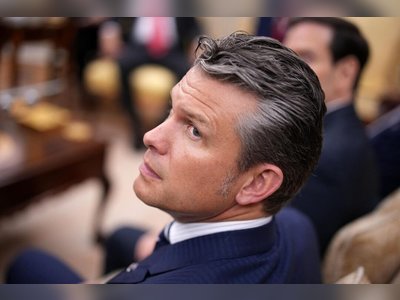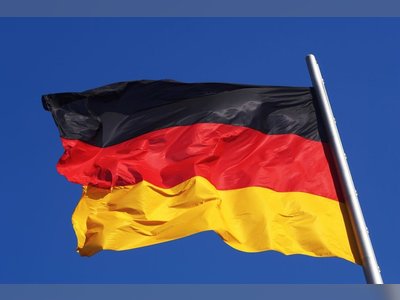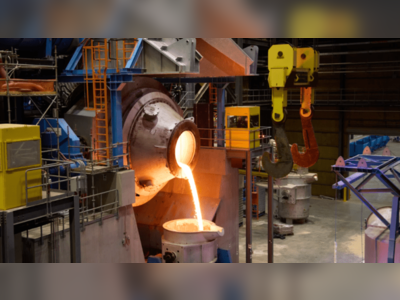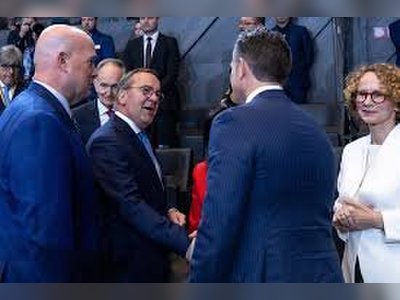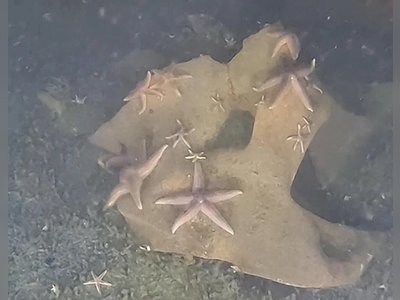Trump and Zelenskyy's Recent Engagement Highlights Tensions in US-Ukraine Relations
Recent interactions between former President Trump and Ukrainian President Zelenskyy indicate escalating diplomatic complexities in US-Ukraine relations amidst ongoing geopolitical tensions.
Recent discussions involving former President Donald Trump and Ukrainian President Volodymyr Zelenskyy exhibit heightened diplomatic engagement that underscores the complexities of US-Ukraine relations.
Amid ongoing tensions due to Russia's military actions in Ukraine, Trump has made assertive remarks suggesting a remnant interest in acquiring Greenland, a territory that has been historically sought by the United States.
Trump's comments emphasize a vision of assertive territorial engagement, which he stated would occur 'one way or the other.' He also affirmed the right of Greenlanders to determine their fate, further embedding the notion of US support for self-determination while simultaneously signaling an intention to negotiate.
In parallel, a different narrative is emerging from the tech industry.
Elon Musk has vocally criticized Zelenskyy, accusing him of fostering a perpetual conflict, which he described as a 'forever war' with Russia.
This accusation has ignited discussions around the nature of international support for Ukraine and the implications of extended military engagements.
Musk's remarks reflect a growing discourse around the sustainability and strategic direction of foreign assistance to Ukraine, particularly as the conflict continues into its second year.
Amid these developments, a minerals deal between Ukraine and the US is reportedly in the works, with Trump suggesting that Zelenskyy could visit Washington shortly to formally sign the agreement.
This potential partnership aims to enhance economic ties and resource management, particularly in the context of global mineral supply chains vital for technology and defense sectors.
The European Union has also proposed a 'win-win' minerals deal for Ukraine, emphasizing mutually beneficial arrangements to strengthen solidarity and cooperation between Europe and Ukraine.
EU officials, including Stéphane Séjourné, have stated their commitment to ensure agreements are consensual and advantageous to both parties involved.
These layered interactions illustrate the multifaceted nature of diplomatic relations involving the US, Ukraine, and Europe, as nations navigate a shifting geopolitics shaped by historical ties, contemporary military conflicts, and global economic strategies.
Amid ongoing tensions due to Russia's military actions in Ukraine, Trump has made assertive remarks suggesting a remnant interest in acquiring Greenland, a territory that has been historically sought by the United States.
Trump's comments emphasize a vision of assertive territorial engagement, which he stated would occur 'one way or the other.' He also affirmed the right of Greenlanders to determine their fate, further embedding the notion of US support for self-determination while simultaneously signaling an intention to negotiate.
In parallel, a different narrative is emerging from the tech industry.
Elon Musk has vocally criticized Zelenskyy, accusing him of fostering a perpetual conflict, which he described as a 'forever war' with Russia.
This accusation has ignited discussions around the nature of international support for Ukraine and the implications of extended military engagements.
Musk's remarks reflect a growing discourse around the sustainability and strategic direction of foreign assistance to Ukraine, particularly as the conflict continues into its second year.
Amid these developments, a minerals deal between Ukraine and the US is reportedly in the works, with Trump suggesting that Zelenskyy could visit Washington shortly to formally sign the agreement.
This potential partnership aims to enhance economic ties and resource management, particularly in the context of global mineral supply chains vital for technology and defense sectors.
The European Union has also proposed a 'win-win' minerals deal for Ukraine, emphasizing mutually beneficial arrangements to strengthen solidarity and cooperation between Europe and Ukraine.
EU officials, including Stéphane Séjourné, have stated their commitment to ensure agreements are consensual and advantageous to both parties involved.
These layered interactions illustrate the multifaceted nature of diplomatic relations involving the US, Ukraine, and Europe, as nations navigate a shifting geopolitics shaped by historical ties, contemporary military conflicts, and global economic strategies.
Translation:
Translated by AI
AI Disclaimer: An advanced artificial intelligence (AI) system generated the content of this page on its own. This innovative technology conducts extensive research from a variety of reliable sources, performs rigorous fact-checking and verification, cleans up and balances biased or manipulated content, and presents a minimal factual summary that is just enough yet essential for you to function as an informed and educated citizen. Please keep in mind, however, that this system is an evolving technology, and as a result, the article may contain accidental inaccuracies or errors. We urge you to help us improve our site by reporting any inaccuracies you find using the "Contact Us" link at the bottom of this page. Your helpful feedback helps us improve our system and deliver more precise content. When you find an article of interest here, please look for the full and extensive coverage of this topic in traditional news sources, as they are written by professional journalists that we try to support, not replace. We appreciate your understanding and assistance.
